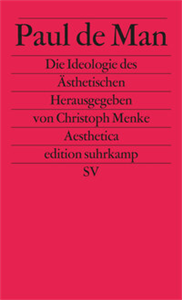Your Search Results
-
Promoted ContentJanuary 2017
Der Deutsch-Russische Handels- und Schiffahrtsvertrag vom 20. März 1894.
(Staats- und socialwissenschaftliche Forschungen XVII.3).
by Human, Arthur
-
Promoted ContentJune 2010
Kinder in Deutschland 2010
2. World Vision Kinderstudie
by Herausgegeben von World Vision Deutschland e.V., World
-
 Trusted Partner
Trusted Partner
-
 Trusted Partner
December 1987
Trusted Partner
December 1987Allegorien des Lesens
by Paul Man, Werner Hamacher, Peter Krumme, Werner Hamacher
Im Falle Paul de Mans ist die begriffliche Charakterisierung seines Vorgehens zusätzlich erschwert dadurch, daß die Theorie nie losgelöst von den Texten, an denen sie gewonnen wird, betrachtet werden kann.
-
 Trusted Partner
June 1993
Trusted Partner
June 1993Die Ideologie des Ästhetischen
by Paul Man, Karl Heinz Bohrer, Christoph Menke, Jürgen Blasius, Christoph Menke
Als Paul de Man 1983 starb, war er der wohl bekannteste und einflußreichste Vertreter einer Richtung der Literaturkritik und ihrer Theore, die allgemein als »dekonstruktiv« bezeichnet wird. Kennzeichnend für diese Richtung ist eine erneute Konzentration auf die innere Verfaßtheit der literarischen Texte. Eine erste Auswahl dieser methodisch vorbildlich wie brillant geschriebenen Texte ist 1988 unter dem Titel »Allegorien des Lesens« in der edition suhrkamp erschienen. Die vorliegende Auswahl konzentriert sich auf die methodologischen und theoretischen Prämissen dieses Vorhabens, wie sie die Abhandlungen über die Zeitlichkeit der Literatur, über Shelley und über die Autobiographie deutlich machen. Sich auf die immanente Verfaßtheit und Bewegung von Texten einzulassen ist nach de Man kein selbstzweckhaftes, folgenloses Unternehmen. De Man beansprucht vielmehr für seine »Rückkehr zur Philologie« eine allgemeine Bedeutung; die Literaturkritik ist zugleich philosophische und politische Kritik. Damit ist der zweite Schwerpunkt dieser Auswahl bezeichnet. De Man erläutert diese These zum einen in kritischer Auseinandersetzung mit der Philosophie Jacques Derridas. Zum anderen zeigt er an zentralen Texten der ästhetischen Tradition, an Kant und Hegel, daß ihr falsches – »ideologisches« – Verständnis literarischer Texte unter der Kategorie des »Ästhetischen« ebenso weitreichende philosophische wie politische Konsequenzen hat.
-
 Trusted Partner
June 2017
Trusted Partner
June 2017Frauen der 1920er Jahre
Glamour, Stil und Avantgarde
by Thomas Bleitner, Man Ray, Edward Steichen, Claude Cahun, Dora Kallmus
In den 1920er Jahren war vieles wagemutiger, unkonventioneller und exzessiver als heute. Keine Zeit hat so viel Glamour, Stil und Avantgarde hervorgebracht, und eine nie gekannte Experimentierlust erobert Bühnen, Kunstateliers, den Sport und so manches Schlafzimmer. Frauen machen den Flug- und Führerschein, sie greifen zur Filmkamera, sie designen eine neue Mode, sie rauchen und trinken und tanzen fröhlich am Abgrund. Thomas Bleitner stellt in diesem opulent bebilderten Band legendäre und unvergleichliche Frauen aus Film, Fotografie, Sport, Mode und Kunst vor, die in den 1920er Jahren in Berlin, Paris und New York alte Rollenmuster auf den Kopf stellten und damit für Furore sorgten. »Als die Frauen begannen, ihre Röcke zu kürzen und ihre Haare zu stutzen, war dies der größte Umbruch in der Geschichte der Mode der letzten hundert Jahre.« New York Vogue vom 1. Juli 1928
-
 Trusted Partner
Trusted Partner
-
 Trusted Partner
April 2003
Trusted Partner
April 2003Crazy New York
Die Frauen von Harlem und Greenwich Village
by Barnet, Andrea / Illustriert von Abbott, Berenice; Illustriert von Ray, Man; Deutsch Stromberg, Kyra
-
 Trusted Partner
March 2008
Trusted Partner
March 2008Kleine Entdecker – Bleibt die Zeit auch manchmal stehen?
Über unseren Zeitbegriff
by Kang, Seong-Eun / Koreanisch Zaborowski, Hans-Jürgen; Illustriert von Oh, Seung-Man
-
 Trusted Partner
November 2007
Trusted Partner
November 2007Kinder in Deutschland 2007
1. World Vision Kinderstudie
by Herausgegeben von World Vision Deutschland e.V.
-
 Trusted Partner
January 1983
Trusted Partner
January 1983Der Naturgarten
Mehr Platz für einheimische Pflanzen und Tiere
by Schwarz, Urs / Vorwort von Stern, Horst; Herausgegeben von World Wildlife Fund
-
 Trusted Partner
April 2002
Trusted Partner
April 2002Performanz
Zwischen Sprachphilosophie und Kulturwissenschaften
by Uwe Wirth, John L. Austin, John R. Searle, Roland Barthes, Michel Foucault, Jacques Derrida, Wolfgang Iser, Paul Man, Jürgen Habermas, Erving Goffman, Victor Turner, Stanley J. Tambiah, Umberto Eco, Erika Fischer-Lichte, Judith Butler, Sybille Krämer, Doris Kolesch, Annette Jael Lehmann, Niels Werber, Eckhard Schumacher, Uwe Wirth, Uwe Wirth
Nach seinem Erfinder, dem Sprachphilosophen John L. Austin, ist Performanz »ein neues Wort und ein garstiges Wort, und vielleicht hat es auch keine sonderlich großartige Bedeutung«. Mittlerweile findet dieser Begriff jedoch in unterschiedlichster Bedeutung Anwendung in den Kulturwissenschaften, von der Philosophie über die Linguistik, Soziologie, Anthropologie, Ethnologie, Theaterwissenschaft, Literaturtheorie, Medientheorie bis hin zu den Gender Studies. Der Band versammelt die Grundlagentexte von Austin bis Butler und zeigt in Originalbeiträgen Perspektiven der aktuellen Performanzdebatte auf.
-
 Trusted Partner
Humanities & Social SciencesNovember 2023
Trusted Partner
Humanities & Social SciencesNovember 2023Critical theory and human rights
From compassion to coercion
by David McGrogan
This book describes how human rights have given rise to a vision of benevolent governance that, if fully realised, would be antithetical to individual freedom. It describes human rights' evolution into a grand but nebulous project, rooted in compassion, with the overarching aim of improving universal welfare by defining the conditions of human well-being and imposing obligations on the state and other actors to realise them. This gives rise to a form of managerialism, preoccupied with measuring and improving the 'human rights performance' of the state, businesses and so on. The ultimate result is the 'governmentalisation' of a pastoral form of global human rights governance, in which power is exercised for the general good, moulded by a complex regulatory sphere which shapes the field of action for the individual at every turn. This, unsurprisingly, does not appeal to rights-holders themselves.
-
 Trusted Partner
International relationsApril 2010
Trusted Partner
International relationsApril 2010Human Rights and the Borders of Suffering
The Promotion of Human Rights in International Politics
by Anne Brown
This book, newly available in paperback, argues for greater openness in the ways we approach human rights and international rights promotion, and in so doing brings some new understanding to old debates. Starting with the realities of abuse rather than the liberal architecture of rights, it casts human rights as a language for probing the political dimensions of suffering. Seen in this context, the predominant Western models of rights generate a substantial but also problematic and not always emancipatory array of practices. These models are far from answering the questions about the nature of political community that are raised by the systemic infliction of suffering. Rather than a simple message from 'us' to 'them', then, rights promotion is a long and difficult conversation about the relationship between political organisations and suffering. Three case studies are explored - the Tiananmen Square massacre, East Timor's violent modern history and the circumstances of indigenous Australians. The purpose of these discussions is not to elaborate on a new theory of rights, but to work towards rights practices that are more responsive to the spectrum of injury that we inflict and endure. The book is a valuable and innovative contribution to rights debates for students of international politics, political theory, and conflict resolution, as well as for those engaged in the pursuit of human rights.
-
 Trusted Partner
Humanities & Social SciencesApril 2021
Trusted Partner
Humanities & Social SciencesApril 2021Critical theory and human rights
by David McGrogan, Darrow Schecter
-
 Trusted Partner
December 2001
Trusted Partner
December 2001Human Rights, Minority Rights, Women's Rights
Proceedings of the 19th World Congress of the International Association for Philosophy of Law and Social Philosophy, 24th–30th June 19999 in New York
by Herausgegeben von Bröstl, Alexander; Herausgegeben von Pavcnik, Marijan
-
 Trusted Partner
2022
Trusted Partner
2022aporello: Human Parasites
by Christine Bender-Leitzig, Dr. Reiner Pospischil
Infestation with parasites usually causes revulsion in those affected and many infections are kept secret through shame. In recent times there has also been a rise in non-native parasites, which often remain undetected. This book gives an overview of the most significant human parasites as well as their - prevalence - symptoms - treatment possibilities. The text is accompanied by illustrations that help when giving everyday advice. Practical icons show at a glance when, for example, the authorities must be notified and what special things need to be considered. Highly concentrated knowledge in an instant? That’s aporello!
-
 Trusted Partner
Humanities & Social SciencesOctober 2024
Trusted Partner
Humanities & Social SciencesOctober 2024Humanitarianism, empire and transnationalism, 1760-1995
Selective humanity in the Anglophone world
by Joy Damousi, Trevor Burnard, Alan Lester
This is the first book to examine the shifting relationship between humanitarianism and the expansion, consolidation and postcolonial transformation of the Anglophone world across three centuries, from the antislavery campaign of the late eighteenth century to the role of NGOs balancing humanitarianism and human rights in the late twentieth century. Contributors explore the trade-offs between humane concern and the altered context of colonial and postcolonial realpolitik. They also showcase an array of methodologies and sources with which to explore the relationship between humanitarianism and colonialism. These range from the biography of material objects to interviews as well as more conventional archival enquiry. They also include work with and for Indigenous people whose family histories have been defined in large part by 'humanitarian' interventions.
-
 Trusted Partner
Humanities & Social SciencesSeptember 2021
Trusted Partner
Humanities & Social SciencesSeptember 2021A precarious equilibrium
Human rights and détente in Jimmy Carter's Soviet policy
by Umberto Tulli
Human rights and détente inextricably intertwined during Carter's years. By promoting human rights in the USSR, Carter sought to build a domestic consensus for détente; through bipolar dialogue, he tried to advance human rights in the USSR. But, human rights contributed to the erosion of détente without achieving a lasting domestic consensus.
-
 Trusted Partner
January 2014
Trusted Partner
January 2014Human Rights and Global Justice
The 10th Kobe Lectures, July 2011
by Herausgegeben von Sakurai, Tetsu; Herausgegeben von Usami, Makoto



























